Part 1: An unexpected visitor
Wadjet Eye Games presents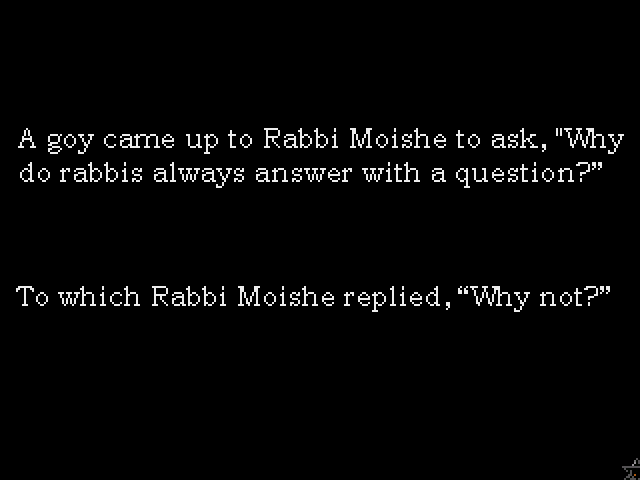
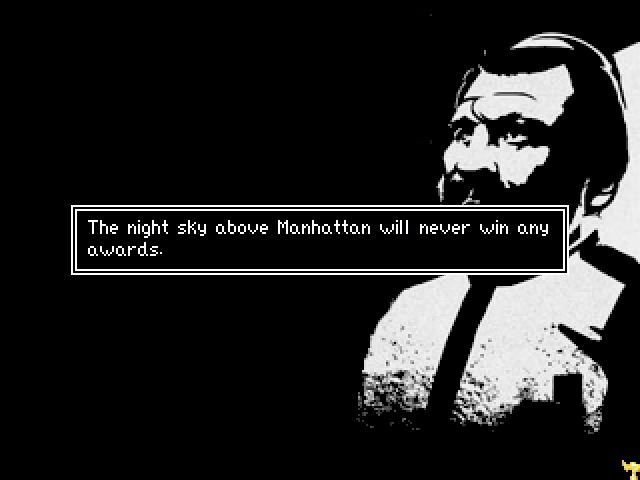
The few stars visible looked lonely and desperate.
I could relate.

I no longer knew which side I stood on.
There are those who would say that I had no business being here.
They might be right.
I'm no longer sure what I'm doing.
But I'm fairly sure I know who I am.
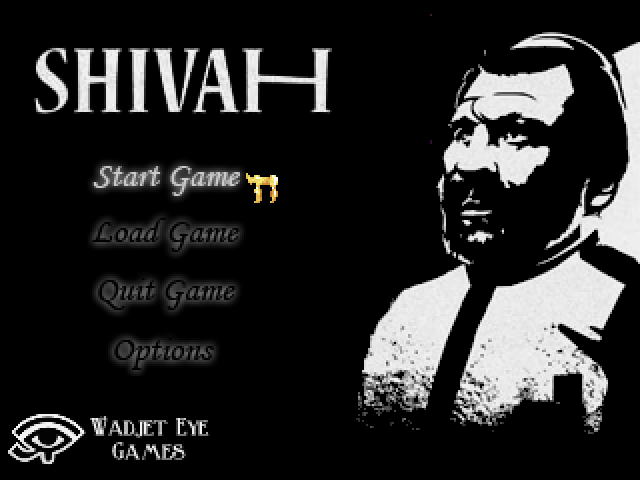
It began, as many things do, with a song.
The mouse pointer is Chai, a word consisting of two Hebrew letters, Chet and Yud, and meaning "living", or "life". It's probably one of the most common symbols of the Jewish faith, next to the Star of David. Lots of people have jewelry with it, for example, and the traditional toast is 'l'chayim', or 'to life'.*
*Thanks to peo for pointing that out!
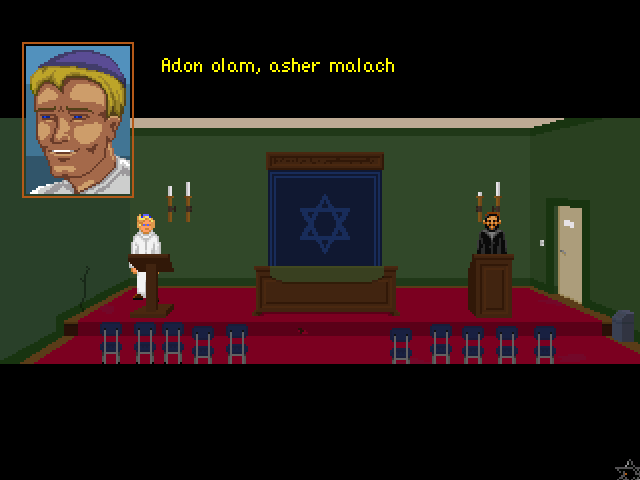
"Eternal master, who reigned supreme"
The song is Adon Olam, "Lord of the World," allegedly composed in the XIth century by Solomon ibn Gabirol. In the Hebrew Bible, Adon, meaning "Lord", "Master" or "Ruler", is a title of honour. (It isn't, however, exclusive to Yahweh: King David, for example, is also referred to as adon). In Judaism, YHWH is the peerless and undisputed ruler of history and the universe, which is just what the hymn Adon Olam is about. Adon Olam is sung at the close of the Sabbath and festival morning services. It can also be found in the composition of bedtime prayers and is recited on one's deathbed, which is... appropriate given the sorry state of our protagonist's life currently.
 B'terem kol y'tzir nivra
B'terem kol y'tzir nivra"Before all of creation was drawn"
 L'et na'asah v'cheftzo kol
L'et na'asah v'cheftzo kol"When it was finished according to his will"
 Azai melech, sh'mo nikra
Azai melech, sh'mo nikra"Then "King" his name was proclaimed to be"
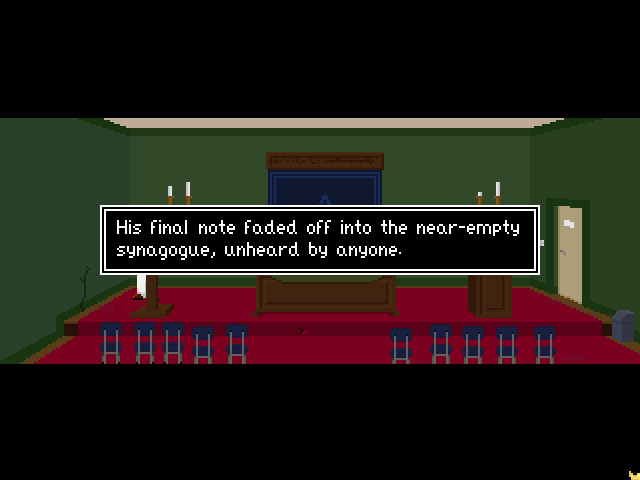
As I had hundreds of times before this, I got ready to speak.
And, as I had hundreds of times before this, I began to wonder why.
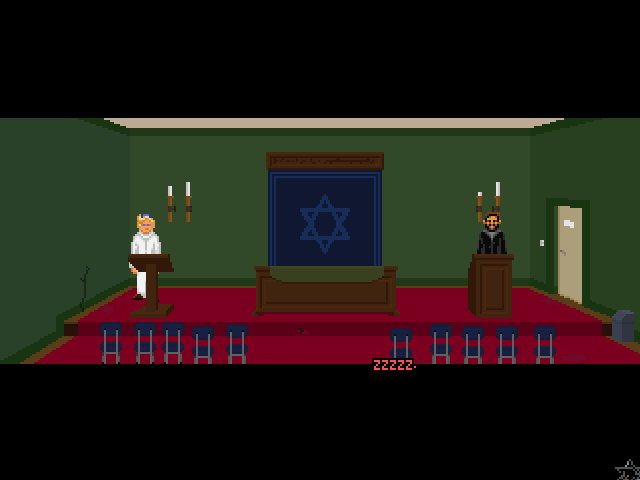
There is only one person in the audience, and she's asleep.
 Ahem.
Ahem. Thank you, Cantor Kaplan.
Thank you, Cantor Kaplan. Today in my sermon, I'd like to discuss suffering.
Today in my sermon, I'd like to discuss suffering.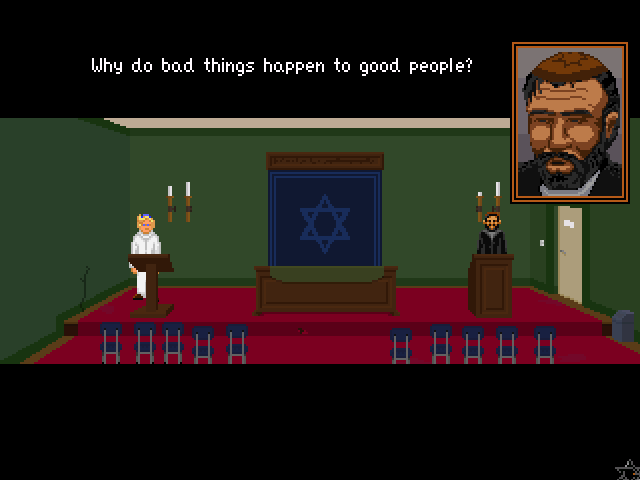
 Wherever there is pain, or oppression, or poverty... The question is always the same. "How could God let this happen?"
Wherever there is pain, or oppression, or poverty... The question is always the same. "How could God let this happen?"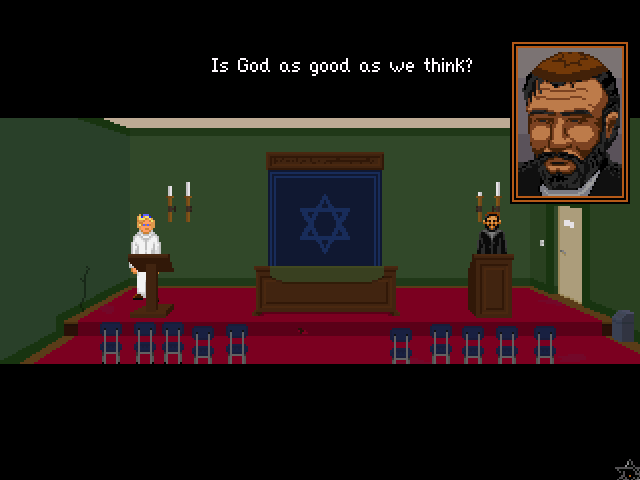
 Can he, in fact, do evil? Maybe, on occasion, he even enjoys inflicting pain?
Can he, in fact, do evil? Maybe, on occasion, he even enjoys inflicting pain?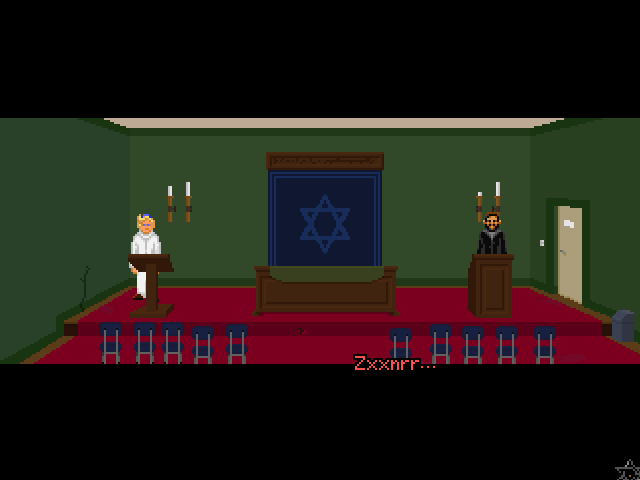
 I... ...
I... ...Rabbi Stone looks around the room.
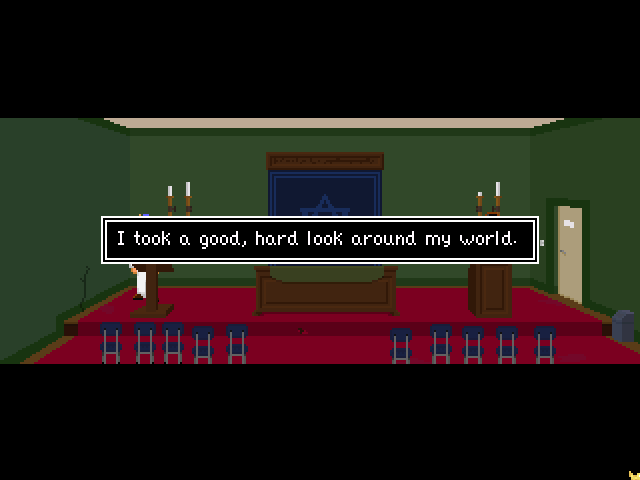
 I...
I...And then it hit me.
 No. I can't do this.
No. I can't do this. I'm sorry.
I'm sorry.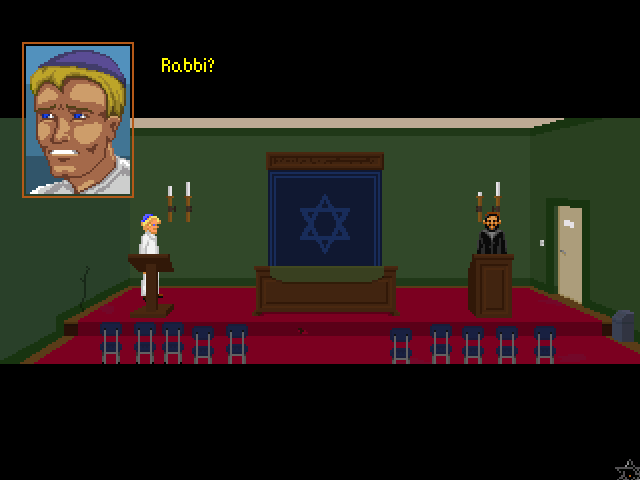
 You heard.
You heard.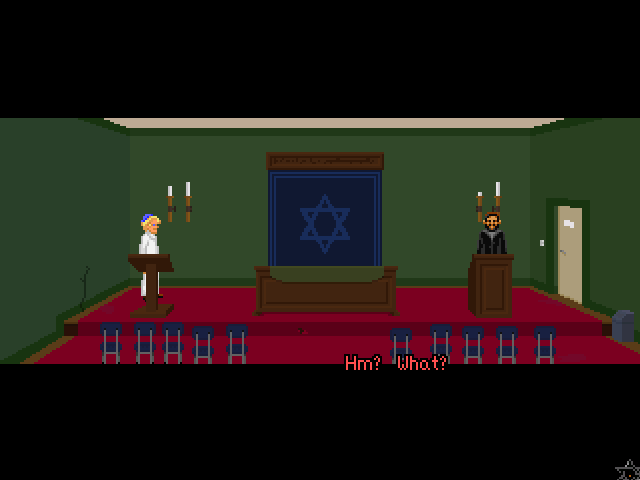
 Go home, Mrs. Raimer.
Go home, Mrs. Raimer.Mrs. Raimer: Is it over already?
 Yeah.
Yeah.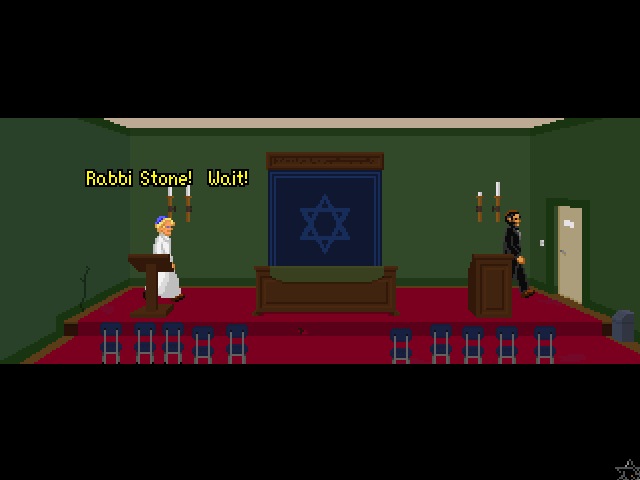
 You can't just stop!
You can't just stop! Sure I can. Just watch me.
Sure I can. Just watch me. But...
But...Rabbi Stone turns away to the door.
 It's OVER, Josh.
It's OVER, Josh. You can't mean that!
You can't mean that! Look, you're a good kid. You've got a good voice and a good future. Don't let me hold you back.
Look, you're a good kid. You've got a good voice and a good future. Don't let me hold you back.He turns around again.
 Now do a mitzvah and call Mrs. Raimer a cab.
Now do a mitzvah and call Mrs. Raimer a cab. I...
I... Good bye, Josh.
Good bye, Josh.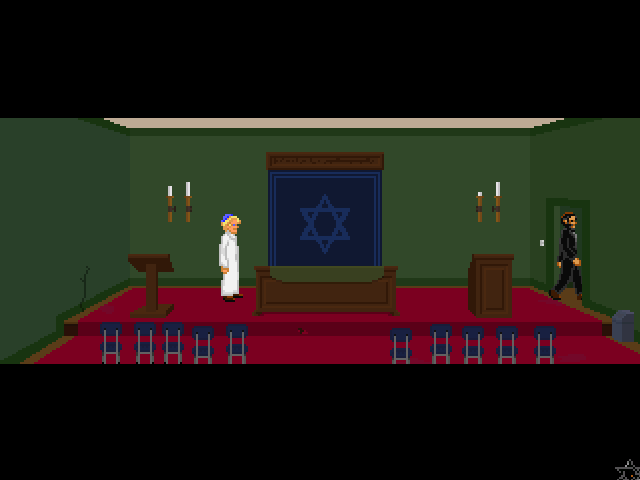
The Rabbi enters his room.
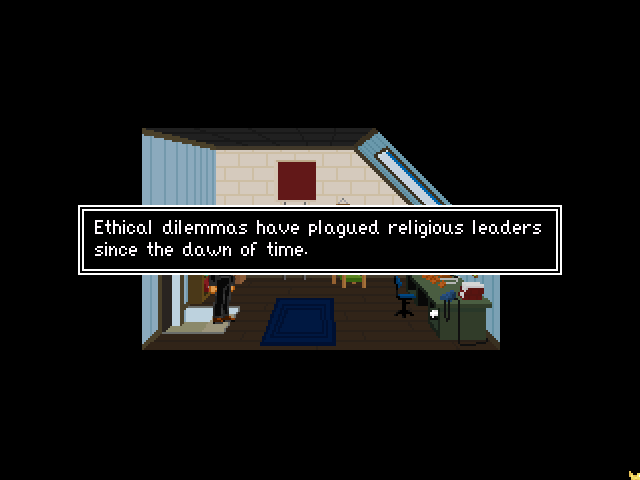
But morals don't mean crap without the personal experiences to back them up.
When suddenly...

And we are presented with three dialogue options.
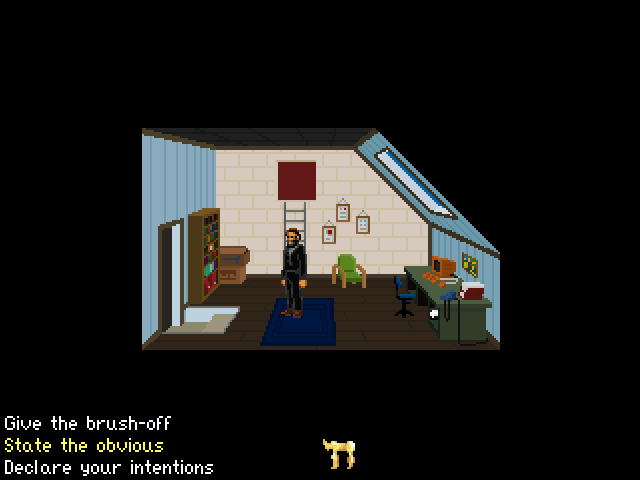
In order to reduce the number of images per update, I will most of the time present dialogue choices like this:
Give the brush-off
> State the obvious
Declare your intentions
The option we've selected is in bold.
 Services are cancelled.
Services are cancelled.*knock* *knock*
Give the brush-off
> Restate the obvious
Declare your intentions
 I repeat, services are cancelled.
I repeat, services are cancelled.*knock* *knock*
> Give the brush-off
Declare your intentions
Grudgingly acquiesce
 Go away.
Go away.*knock* *knock*
> Give a stronger brush-off
Declare your intentions
Grudgingly acquiesce
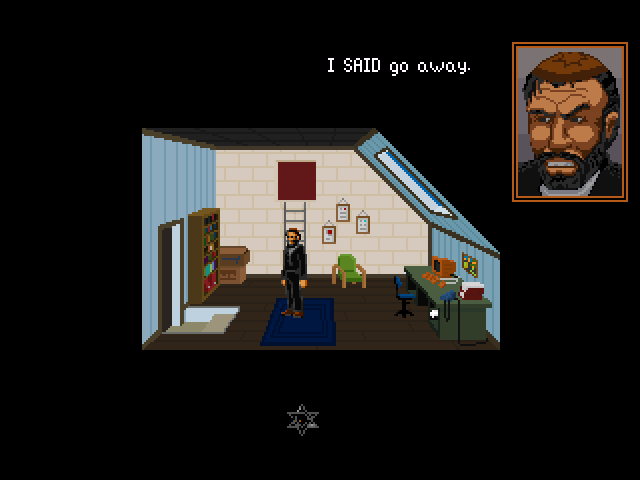
During the non-interactive parts of the game, when things just happen, the pointer changes to the six-pointed Star of David (Magen David, or "The Shield of David"). The Shield of David is one of God's titles, which eventually came to be identified with the six-pointed star as "the seal of Solomon" (a sign of his dominion over the demons). Then, in the 19th century, it evolved into the universal symbol of Jewish identity.
Encyclopedia Judaica posted:
The prime motive behind the wide diffusion of the sign in the 19th century was the desire to imitate Christianity. The Jews looked for a striking and simple sign which would "symbolize" Judaism in the same way as the cross symbolizes Christianity. This led to the ascendancy of the magen David in official use, on ritual objects and in many other ways. From central and Western Europe it made its way to Eastern Europe and to Oriental Jewry. Almost every synagogue bore it; innumerable communities, and private and charitable organizations stamped it on their seals and letterheads. ... In in 1822 it was used on the Rothschild family coat of arms when they were raised to the nobility by the Austrian emperor; and from 1840 Heinrich Heine signed his correspondence from Paris in the Augsburger Allgemeine Zeitung with a magen David instead of his name, a remarkable indication of his Jewish identification in spite of his conversion. From such general use it was taken over by the Zionist movement. The very first issue of Die Welt, Herzl's Zionist journal, bore it as its emblem.
*knock* *knock*
> Declare your intentions
Grudgingly acquiesce
 Leave me alone.
Leave me alone.*knock* *knock*
> Redeclare your intentions
Grudgingly acquiesce
 Leave me alone, I said!
Leave me alone, I said!*knock* *knock*
We have to finally give up, however.
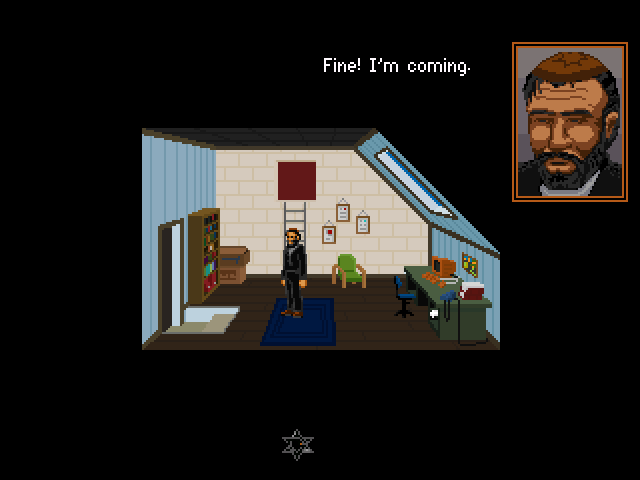
Before opening the door, we can explore the room a little.
The interface is point-and-click. The items of interest in the room are a bookshelf, some boxes, a certificate, a diploma, a poster, a computer, a trash can, a photograph, and a pile of papers.
Bookshelf: My collection of Rabbinical texts, prayer books, Judaic history, and Harry Kemelman novels.
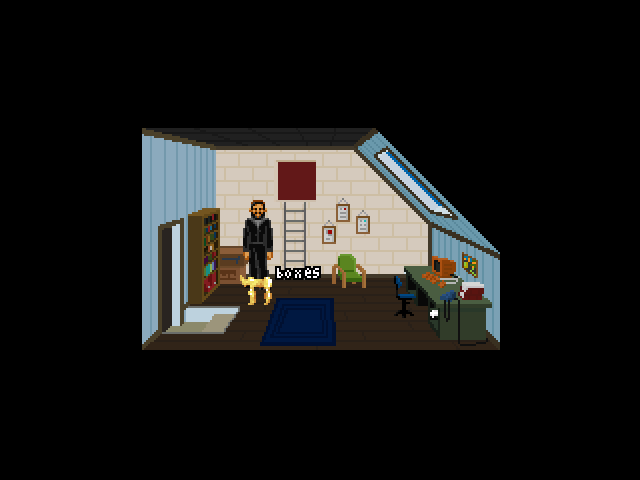
These boxes contained a small supply of Kiddish wine. As much as I would have loved to break open a bottle of Kiddish wine, I didn't think it was appropriate.
Encyclopedia Judaica posted:
Kiddush (Heb. "sanctification"), prayer recited over a cup of wine in the home and the synagogue to consecrate the Sabbath or festival in fulfillment of the biblical commandment to "Remember the Sabbath day, to keep it holy" (Ex. 20:8).
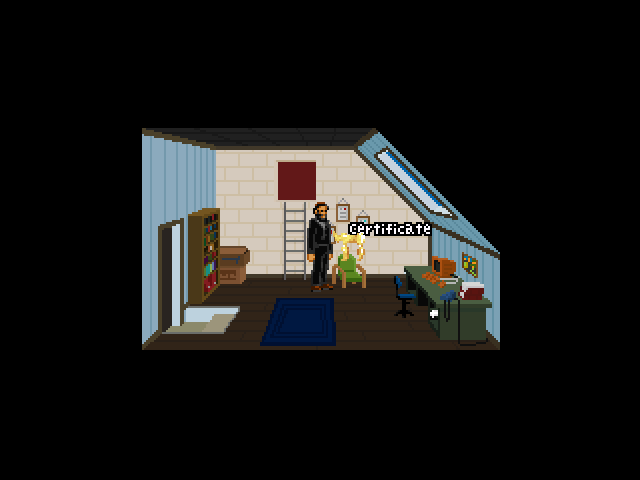
My certification of rabbinical studies. It reads: "This is to certify that Russell Elijah Stone has been granted the title of RABBI by B'nai Brith Yesheva on the date of June 23, 1970."
There's a diploma nearby, too.
My diploma from B'nai Brith Yesheva.
Yeshivah is a local institution for the pursuit of talmudic studies. B'nai B'rith is the oldest internation Jewish organisation founded in 1843 in New York City and committed to the security and continuity of Israel and the Jewish people.
 Has it really been thirty years?
Has it really been thirty years?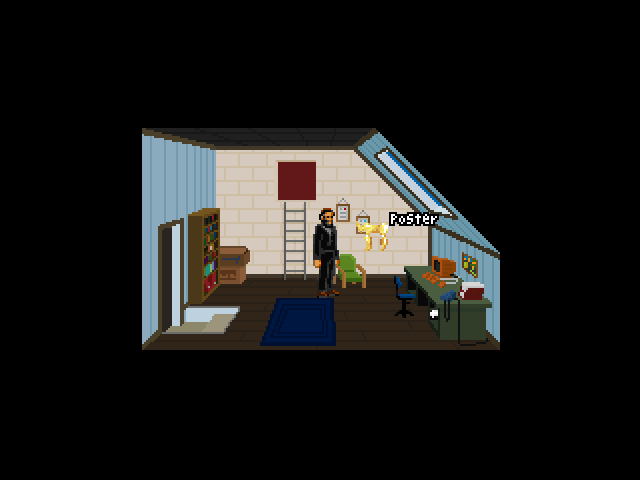
I had come across this quote some years ago, and had decided to have it printed and mounted on the wall.
It read: "If statistics are right, the Jews constitute but one percent of the human race. It suggests a nebulous dim puff of stardust lost in the blaze of the Milky way. Properly, the Jew ought hardly to be heard of, but he is heard of, has always been heard of." - Mark Twain, 1899
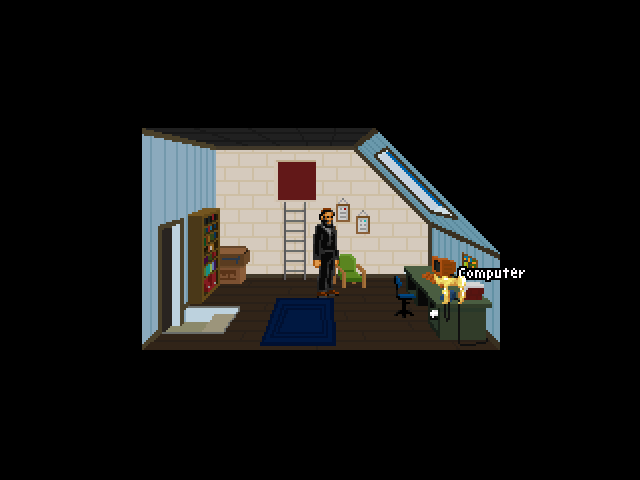
Someone was at the door. I couldn't futz with computer now.
Josh picked this computer up at a local yard sale. He said it would "revolutionize my life."
That hadn't happened yet, but I wasn't holding my breath.
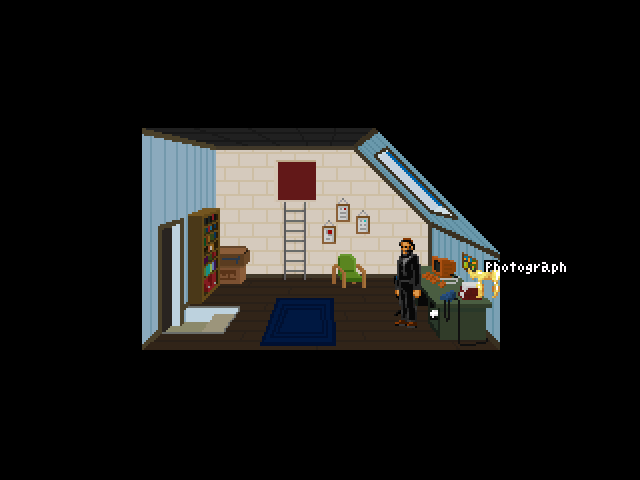
A color photograph of a B'nai Ben-Zion youth group picnic hung on the wall.
It was taken over fifteen years ago. Most of those kids probably had families of their own by now.
Alright, enough poking around. Let's see who's been demanding to see us.
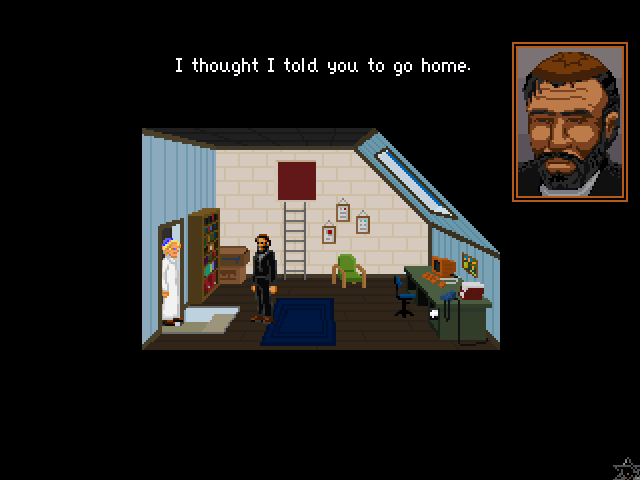
 Rabbi Stone, there's someone here.
Rabbi Stone, there's someone here. Tell 'em to get lost. There's no service tonight.
Tell 'em to get lost. There's no service tonight. No. It's, um, a COP.
No. It's, um, a COP. Huh?
Huh?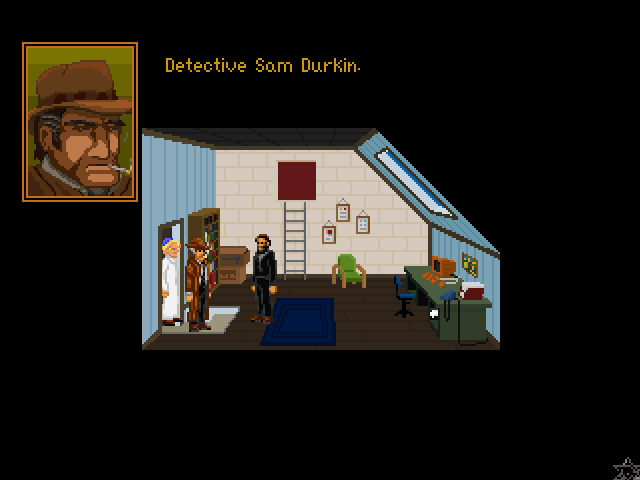
 Midtown South Precinct. Could I talk to you for a few minutes, Rabbi Stone?
Midtown South Precinct. Could I talk to you for a few minutes, Rabbi Stone?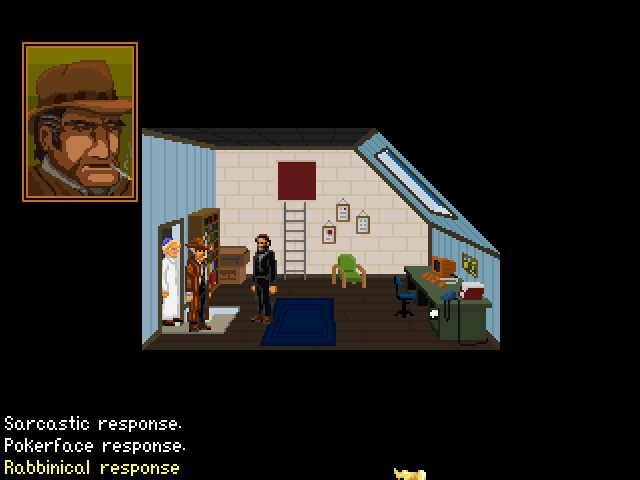
The game often has you choose the tone and style of your response. It is somewhat similar to the dialogue system used in Obsidian's Alpha Protocol. I even thought of having "Aleph Protocol" as the thread title, but that'd be a tad too silly. Aleph is the first letter of the Hebrew alphabet, by the way, the beginning of all things.
For the authentic kind of experience, let's go for a Rabbinical response.
Sarcastic response
Pokerface response
> Rabbinical response
 Is there some sort of problem, officer?
Is there some sort of problem, officer? I'd just like to ask you a few questions.
I'd just like to ask you a few questions. Fine.
Fine.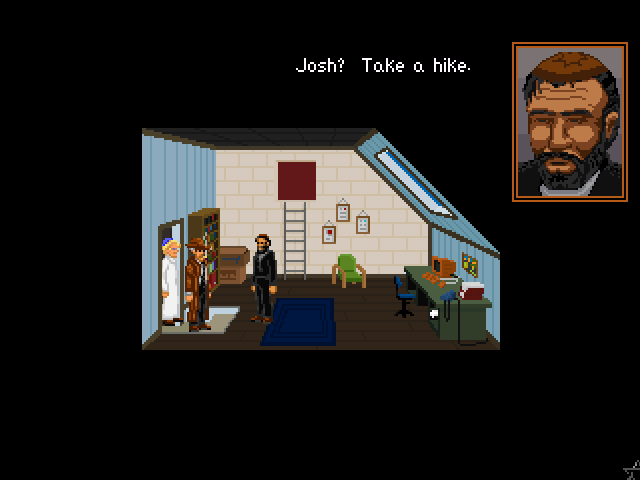
The cantor leaves.
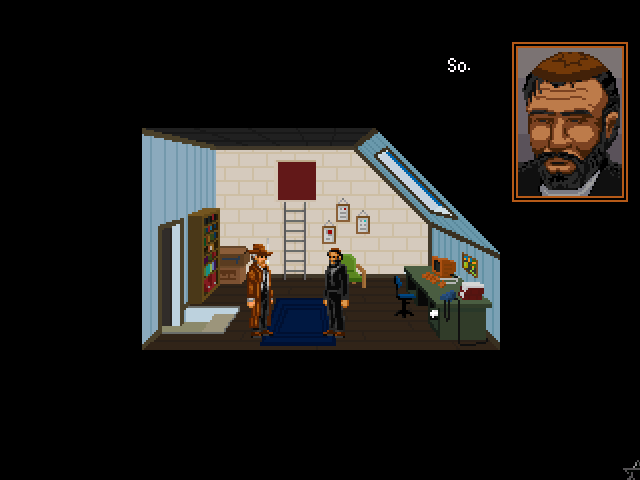
 What can I do for you? I assume you're not here to convert.
What can I do for you? I assume you're not here to convert. Are you familiar with a Mr. Jack Lauder?
Are you familiar with a Mr. Jack Lauder? Should I be?
Should I be? I'm asking the questions, Rabbi.
I'm asking the questions, Rabbi. Fine, let me think. Lauder...
Fine, let me think. Lauder...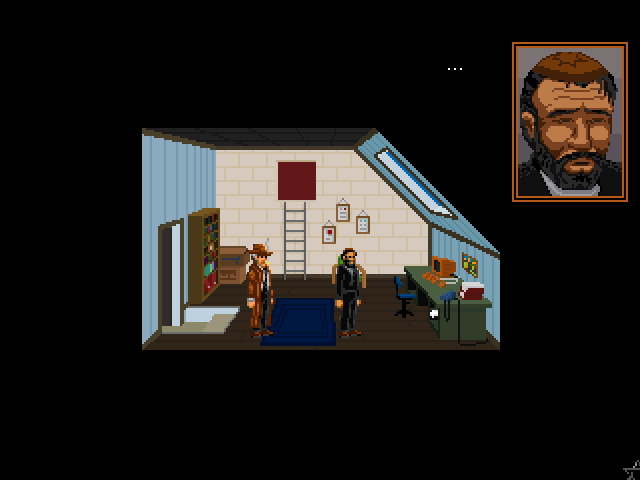
 Oh.
Oh. You know him?
You know him? Yeah.
Yeah. What can you tell me about him?
What can you tell me about him? He used to belong to this congregation.
He used to belong to this congregation. Used to, but not anymore?
Used to, but not anymore? No. Left about eight years ago, I think. What's this about?
No. Left about eight years ago, I think. What's this about? Have you had any contact with him since?
Have you had any contact with him since? No I haven't. Care to fill me in, here?
No I haven't. Care to fill me in, here? Do you read the papers?
Do you read the papers?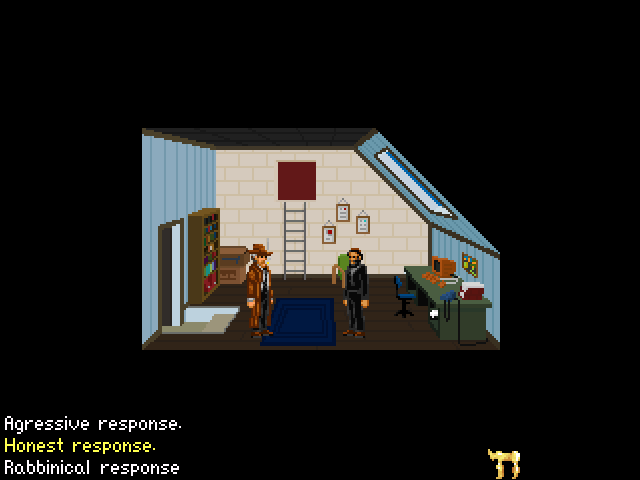
Let's make it honest. What care has a Rabbi for the papers?
 Not recently.
Not recently.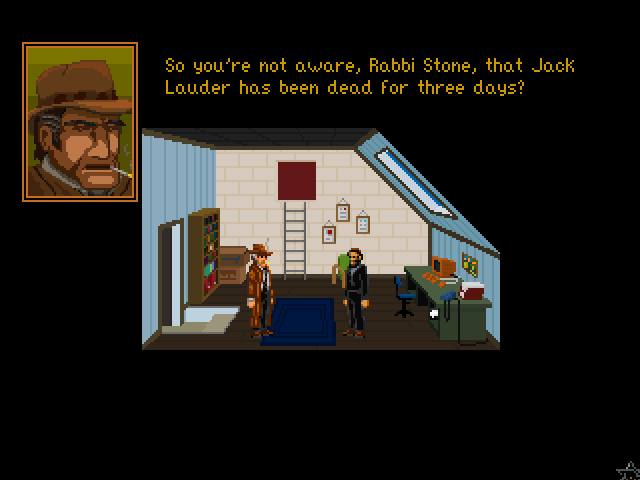
I did my best to control myself.
I knew this man's type. His eyes scanned my face like a barcode reader, trying to read every telltale sign of emotion. Any flicker, any twitch, could be used against me later.
 No.
No. Does that bother you?
Does that bother you? Should it?
Should it? Answer me, Stone.
Answer me, Stone. No.
No. So you and Mr. Lauder weren't close?
So you and Mr. Lauder weren't close? No we weren't. What's the deal, Durkin?
No we weren't. What's the deal, Durkin? I've seen Lauder's will.
I've seen Lauder's will.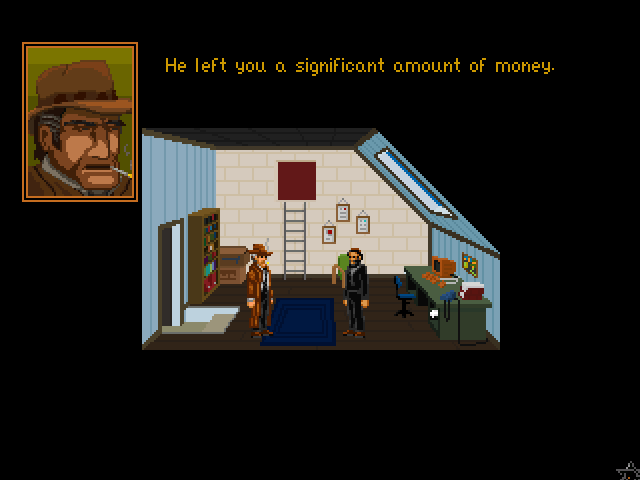
Deadpan response
Incredulous response
> Rabbinical response
 He left me money?
He left me money?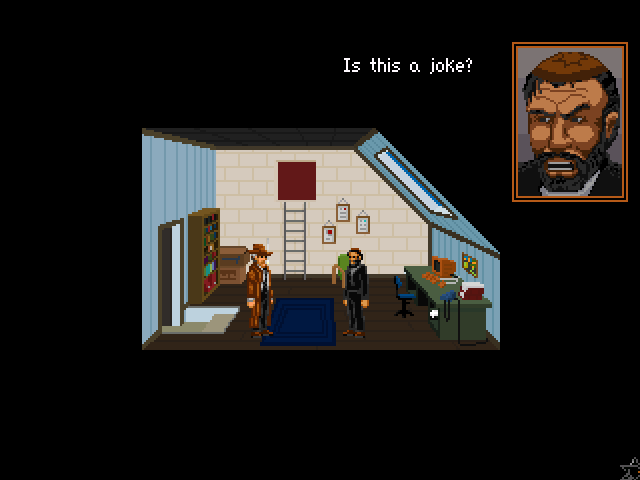
 Are you joking with me, Detective?
Are you joking with me, Detective? No. I'm not joking.
No. I'm not joking. How much?
How much? I don't have the exact amount, but somewhere in excess of ten thousand.
I don't have the exact amount, but somewhere in excess of ten thousand. Bull.
Bull. It's the truth.
It's the truth.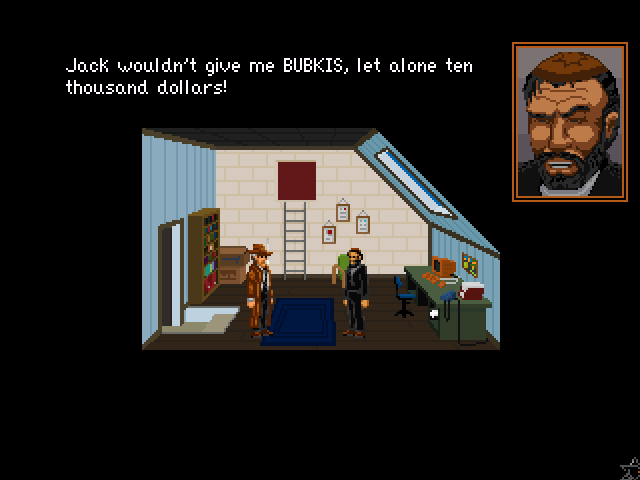
Literal translation: "wouldn't give me goat shit". Bubkis or bupkis (also bobkes, bopkes, bubkes, bupkes, bupkiss, bupkus) comes from the Yiddish word kozebopkes meaning "goat droppings". Figuratively, it means absolutely nothing of value, significance, or substance.
 And why is that, Rabbi Stone?
And why is that, Rabbi Stone? ...
...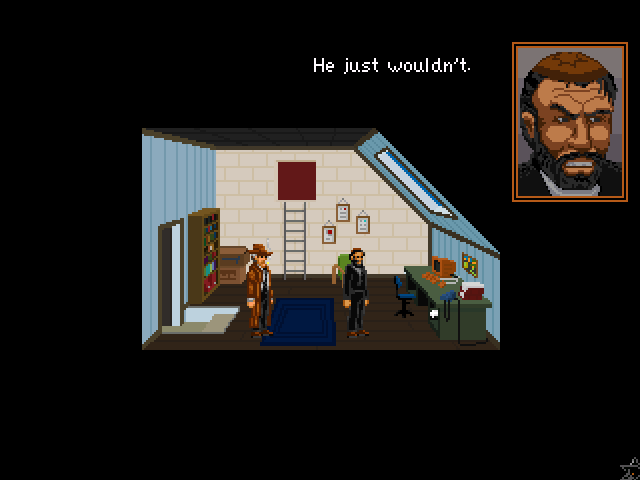
 Hm.
Hm.Durkin takes a look around and then moves closer to the Rabbi.
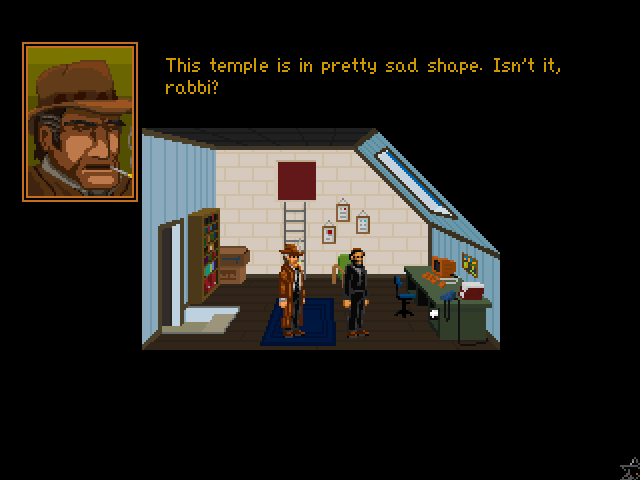
 ...
... Well you're not blind, that's for sure.
Well you're not blind, that's for sure. Can you afford the repairs?
Can you afford the repairs? I...
I...Angry response
Brush-off response
> Rabbinical response
 Do I LOOK like I can afford it?
Do I LOOK like I can afford it? I'm just asking--
I'm just asking--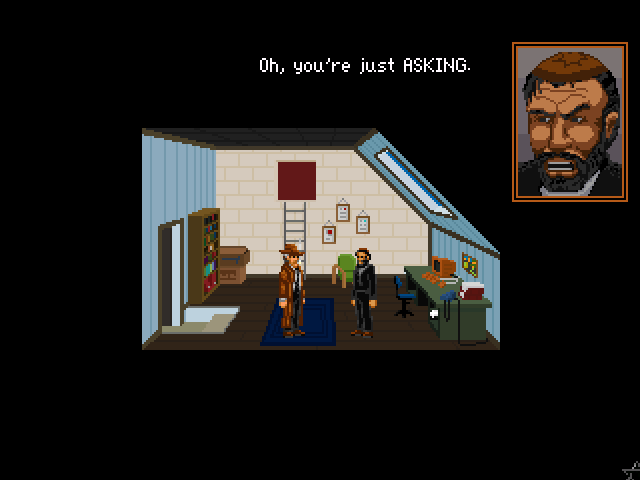
 Well, I'm going to ASK you to leave.
Well, I'm going to ASK you to leave. Don't let the door hit you on the way out.
Don't let the door hit you on the way out. Rabbi Stone--
Rabbi Stone-- Get out of my office.
Get out of my office. Listen--
Listen-- No. YOU listen. I know where this is going.
No. YOU listen. I know where this is going. And I don't like it.
And I don't like it. I'm just doing my job.
I'm just doing my job.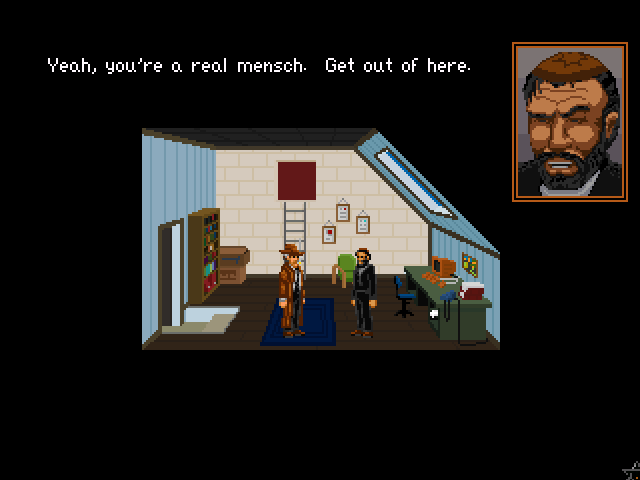
 Fine, I'll leave, Rabbi Stone. But I'll be back.
Fine, I'll leave, Rabbi Stone. But I'll be back. Yeah, I bet you will.
Yeah, I bet you will.Detective Durkin turns around and leaves the room.
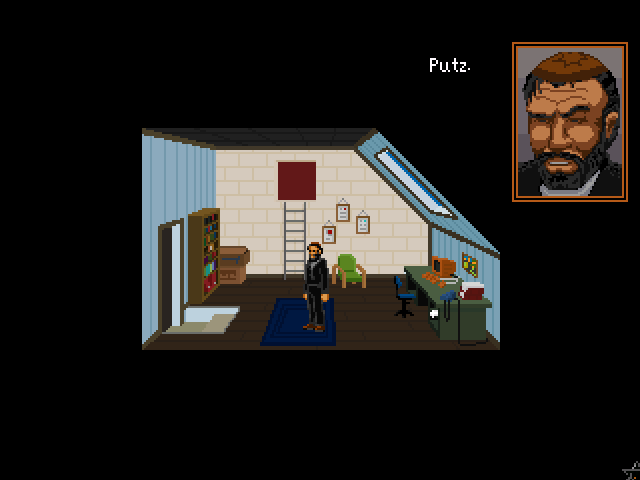
The Rabbi approaches the window, thinking.
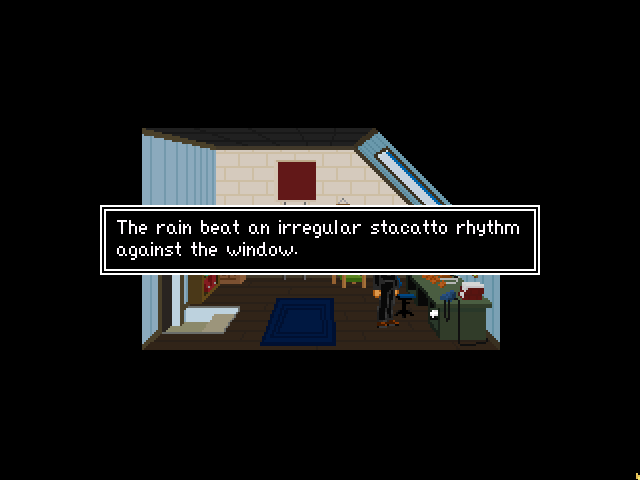
But I could only hear one thing.
"Jack Lauder." "Jack Lauder."
The name pulled out a cork in my brain, letting loose old thoughts and memories that fought and struggled for supremacy.
Jack Lauder. It was more than just a name.
It was a link to a time when things were simpler.
A time when I thought I had it all figured out.
A time when morals and ethics meant something.
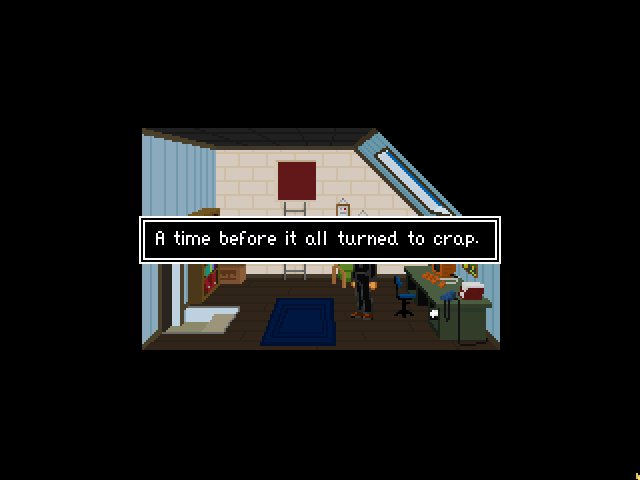
 I need to think.
I need to think.